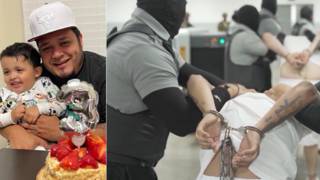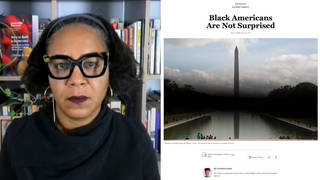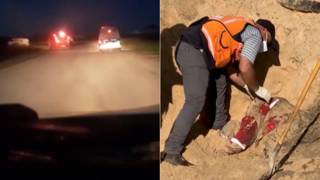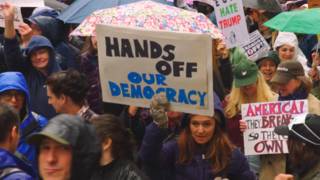
After three weeks of fighting, a ceasefire has begun in the Iraqi holy city of Najaf ending three weeks of fighting between the U.S. military and backers of the Shiite cleric Moqtada al Sadr. We speak with independent journalist and author Rahul Mahajan. [includes rush transcript]
A ceasefire has begun in the Iraqi holy city of Najaf ending three weeks of fighting between the U.S. military and backers of the Shiite cleric Moqtada al Sadr.
The country’s leading Shiite religious leader, the Grand Ayatollah Ali Sistani, led a peaceful march into Najaf with over 10,000 supporters yesterday to meet with Sadr.
Sadr ordered his army to disarm and hand over the keys to the holy shrine. He told them “To all my brothers in Mahdi Army … you should leave Kufa and Najaf without your weapons, along with the peaceful masses.”
Dozens were seen to put down their weapons while other militia members are believed to remain armed.
As part of the ceasefire agreement the US agreed to pull its troops out of Najaf. In addition, Sadr was guaranteed the right to participate in Iraqi politics even though he was charged by the US occupation authorities with murder.
- Rahul Mahajan, independent journalist and author of “Full Spectrum Dominance: U.S. Power in Iraq and Beyond” (Seven Stories). He has a Ph.D. in particle physics.
Transcript
AMY GOODMAN: Rahul Mahajan is on the line with us, independent reporter, author of Full Spectrum Dominance: U.S. Power in Iraq and Beyond. Can you talk about the significance of what’s taking place right now in Najaf, Rahul?
RAHUL MAHAJAN: Well, I’m putting together various sporadic reports. It looks like this whole offensive has involved killing at least 700 Iraqis, maybe up to 1,000. It was largely unprovoked offensive by the United States. And the significance of this resolution is, I think, it is a stunning political defeat for the United States. It has massively re-legitimized Moqtada al Sadr. It has forced Ayatollah Sistani — who is less of an opponent at least to the occupation than al Sadr — it has forced him into a position where he was required to come back in order to maintain any kind of credibility, and the withdrawal of U.S. troops from the main part of Najaf after spending several weeks pounding them into rubble, is going to have much the same effect that the siege on Fallujah in April followed by the U.S. withdrawal has had there.
AMY GOODMAN: We’re talking to Rahul Mahajan. What about the number of people who died yesterday?
RAHUL MAHAJAN: The various reports, 74–110 in several incidents. There was an artillery shell that hit the main mosque in Kufa. There was a massacre, at least according to reports, of peaceful demonstrators marching from Kufa to Najaf, and some of the numbers also include Mahdi Army people killed in fighting.
JUAN GONZALEZ: Is there any clarity as to whether the U.S. troops have pulled out of Najaf yet?
RAHUL MAHAJAN: As far as I understand, they is simply pulled back to the outskirts of Najaf, rather than out completely.
AMY GOODMAN: And the significance of Sistani and Sadr meeting and what role Sadr will play?
RAHUL MAHAJAN: Well, Sistani, in my view, made a miscalculation by going to London and appearing to wash his hands of the whole matter. Now, what his health situation really is is difficult to ascertain, but a lot of people on the ground were looking at this and saying, Sistani is gone, the center of Najaf is under assault. Because it was not just an assault on the Mahdi Army, they closed off the center of city and subjected it to repeated shelling. And people were starting to call Sistani a coward. In fact, in order to maintain credibility, he had to come back. The agreement involves basically no concession by Moqtada al Sadr. In order to get the few hundred Mahdi Army militia men holed up in the mosque out to even allow them to disperse into the community, they had to turn in the weapons that they were stockpiling in the mosque. But it doesn’t mean any kind of disarming of the Mahdi Army. I mean, every shopkeeper in the country has a kalashnikov. You can buy a rocket propelled grenade for $20. This is — all the concessions Sadr made are purely face-saving for the Allawi government and the United States and the real loss here, I think, is for the occupation.
AMY GOODMAN: Rahul Mahajan, independent journalist, author of, Full Spectrum Dominance: U.S. Power in Iraq and Beyond. This is Democracy Now!












Media Options